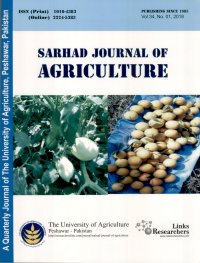Influence of Biochar based Organic Fertilizers on Growth and Concentration of Heavy Metals in Tomato and Lettuce in Chromite Mine Tailings Contaminated Soil
Influence of Biochar based Organic Fertilizers on Growth and Concentration of Heavy Metals in Tomato and Lettuce in Chromite Mine Tailings Contaminated Soil
Faiza Altaf1, Shamim Gul1,2*, Tasawar Ali Chandio3, Gul Bano Rehman1, Attiq-ur-Rehman Kakar4, Sami Ullah4, Naqeebullah Khan4, Umbreen Shaheen5, Muhammad Naeem Shahwani6, Muhammad Ajmal7 and Misbah Manzoor8
Tomato plants grown under various treatments, control 1; soil without any amendment, control 2; soil with amendment of Cr mine tailing debris, WBPM1; wood-derived biochar + poultry manure amended at 10% rate in Cr mine tailing debris-contaminated soil, WBPM2; wood-derived biochar + poultry manure amended at 20% rate in Cr mine tailing debris-contaminated soil, WBPMR2; wood-derived biochar + poultry manure amended at 20% rate in Cr mine tailing debris-contaminated soil, FYPMR1; cow manure –derived biochar + poultry manure amended at 1-% rate in Cr mine tailing debris-contaminated soil, FYPMR2; cow manure-derived biochar + poultry manure amended at 20% rate in Cr mine tailing debris-contaminated soil.
Lettuce plants grown under various treatments, control 1; soil without any amendment, control 2; soil with amendment of Cr mine tailing debris, WBPM1; wood-derived biochar + poultry manure amended at 10% rate in Cr mine tailing debris-contaminated soil, WBPM2; wood-derived biochar + poultry manure amended at 20% rate in Cr mine tailing debris-contaminated soil, FYPM1; cow manure –derived biochar + poultry manure amended at 1-% rate in Cr mine tailing debris-contaminated soil, FYPM2; cow manure-derived biochar + poultry manure amended at 20% rate in Cr mine tailing debris-contaminated soil, WBPMR1; wood-derived biochar + poultry manure amended at 10% rate in Cr mine tailing debris-contaminated soil, WBPMR2; wood-derived biochar + poultry manure amended at 20% rate in Cr mine tailing debris-contaminated soil, FYPMR1; cow manure –derived biochar + poultry manure amended at 1-% rate in Cr mine tailing debris-contaminated soil, FYPMR2; cow manure-derived biochar + poultry manure amended at 20% rate in Cr mine tailing debris-contaminated soil.
Average (±SD) of aboveground plant biomass and root biomass of tomato and lettuce (n= 3, FYPM2 and FYPMR2 for tomato had only one replication). Bars with different letters show significant difference at P<0.05. control 1; soil without any amendment, control 2; soil with amendment of Cr mine tailing debris, WBPM1; wood-derived biochar + poultry manure amended at 10% rate in Cr mine tailing debris-contaminated soil, WBPM2; wood-derived biochar + poultry manure amended at 20% rate in Cr mine tailing debris-contaminated soil, FYPM1; cow manure –derived biochar + poultry manure amended at 1-% rate in Cr mine tailing debris-contaminated soil, FYPM2; cow manure-derived biochar + poultry manure amended at 20% rate in Cr mine tailing debris-contaminated soil, WBPMR1; wood-derived biochar + poultry manure amended at 10% rate in Cr mine tailing debris-contaminated soil, WBPMR2; wood-derived biochar + poultry manure amended at 20% rate in Cr mine tailing debris-contaminated soil, FYPMR1; cow manure –derived biochar + poultry manure amended at 1-% rate in Cr mine tailing debris-contaminated soil, FYPMR2; cow manure-derived biochar + poultry manure amended at 20% rate in Cr mine tailing debris-contaminated soil.
Average (± SD) of water use efficiency (WUE) of tomato (n= 3, FYPM2 and FYPMR2 for tomato had only one replication). Bars with different letters indicate significant difference at P<0.05. control 1; soil without any amendment, control 2; soil with amendment of Cr mine tailing debris, WBPM1; wood-derived biochar + poultry manure amended at 10% rate in Cr mine tailing debris-contaminated soil, WBPM2; wood-derived biochar + poultry manure amended at 20% rate in Cr mine tailing debris-contaminated soil, FYPM1; cow manure –derived biochar + poultry manure amended at 1-% rate in Cr mine tailing debris-contaminated soil, FYPM2; cow manure-derived biochar + poultry manure amended at 20% rate in Cr mine tailing debris-contaminated soil, WBPMR1; wood-derived biochar + poultry manure amended at 10% rate in Cr mine tailing debris-contaminated soil, WBPMR2; wood-derived biochar + poultry manure amended at 20% rate in Cr mine tailing debris-contaminated soil, FYPMR1; cow manure –derived biochar + poultry manure amended at 1-% rate in Cr mine tailing debris-contaminated soil, FYPMR2; cow manure-derived biochar + poultry manure amended at 20% rate in Cr mine tailing debris-contaminated soil.













